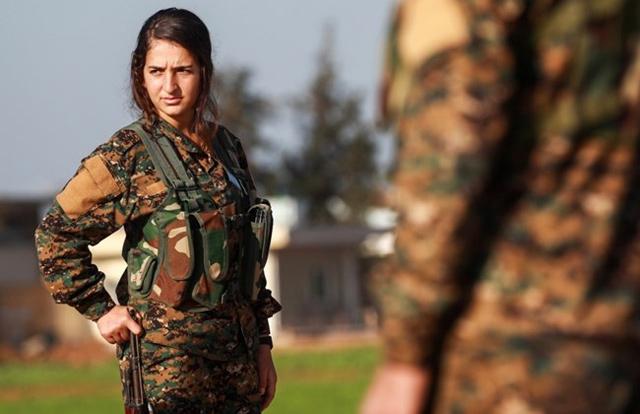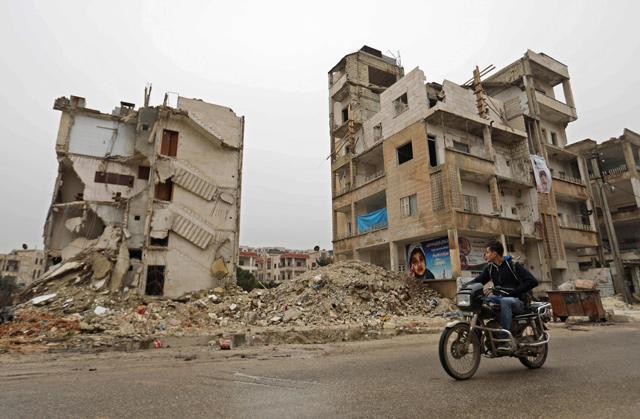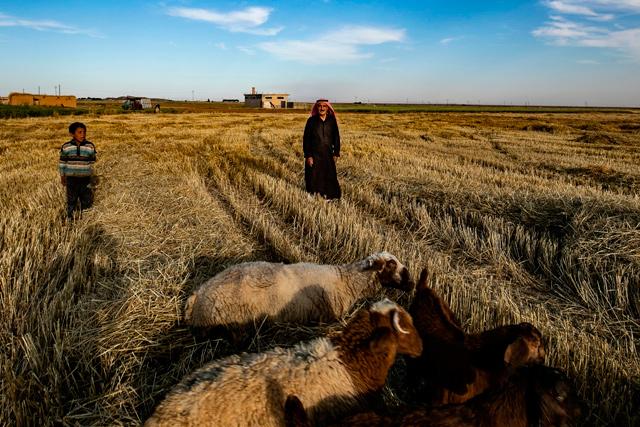You are here
Syria’s Kurds: From the margins to fragile autonomy
By AFP - Dec 29,2018 - Last updated at Dec 29,2018

A fighter from the Kurdish women’s protection units attends a funeral of an Arab fighter of Syrian Democratic Forces in the town Tal Tamr,Syria, on December 21 (AFP photo)
BEIRUT — Syria’s Kurds, who have asked for regime help to face a threatened Turkish offensive, have seen their prospects of increased autonomy change over the course of the war.
Kurdish forces currently control oil-rich regions in northeastern regions that cover around a third of Syria.
Decades of discrimination
Concentrated in the north, Kurds make up around 15 per cent of Syria’s population.
Most are Sunni Muslims, but there are some non-Muslim minorities and many Kurds consider themselves secular.
They have suffered decades of marginalisation and oppression by the ruling Baath Party and have long pushed for their cultural and political rights.
Neutrality, then autonomy
When Syria’s conflict erupted in 2011, the Kurdish population generally sought to adopt a position of neutrality.
President Bashar Assad made conciliatory gestures towards the Kurds from the earliest days of the conflict, granting citizenship to 300,000 people — a key demand for half-a-century.
The Kurds had been stripped of their nationality following a controversial census in 1962.
In 2012, government forces withdrew from Kurdish-majority areas in the north and east, paving the way for Kurds to consolidate control on the ground.
They have since established self-rule in many of these zones and have sought to prevent rebels and regime forces from entering them.
‘Federal region’
In 2013, the Democratic Union Party — the political branch of the powerful People’s Protection Units (YPG) — announced the establishment of a semi-autonomous region.
In 2016, Kurdish authorities unveiled a ‘‘federal region’’ for this territory comprising three cantons: Afrin in Aleppo province, Jazira (Hasakeh province) and Euphrates (which includes parts of Aleppo and Raqqa provinces).
The initiative looked like de facto autonomy, provoking hostility from Syria’s mainstream opposition forces and neighbouring Turkey.
At the end of 2016, the Kurds gave themselves a ‘‘social contract’’ — a kind of constitution for their ‘‘federal region”.
A year later residents of Kurdish regions elect their own municipal councillors.
Anti-terrorists
Kurdish fighters have been one of the most effective forces fighting the Daesh group in Syria, with air support from a US-led coalition.
At the start of 2015, they ousted Daesh from Kobani on the Turkish border after more than four months of fierce fighting.
The Syrian Democratic Forces (SDF), an alliance of Kurdish forces and local Arab militiamen was created in October 2015.
Dominated by the Kurdish YPG, it has been the main ground force battling the remnants of the ‘‘caliphate’’ in eastern Syria.
In October 2017, they ousted Daesh from its de facto Syrian capital, Raqqa, and by the end of 2018 they were still fighting die-hard terrorists near the Iraqi border.
Turkish ire
In January 2018, the US-led coalition announced it was working to create in northern Syria a 30,000-strong border force comprised of Kurdish and Arab fighters, around half of whom would be retrained SDF fighters.
But Ankara accuses the YPG of being the Syrian offshoot of the outlawed Kurdistan Workers’ Party which has waged a three-decade rebellion in Turkey’s southeast.
On January 20, 2018, Turkey launched an air and ground operation against the YPG-held enclave of Afrin, taking control of it on March 18.
Abandoned by Trump
On December 19, US President Donald Trump ordered the forthcoming withdrawal of some 2,000 US soldiers deployed in Syria, who have been fighting the Daesh alongside the YPG.
In the following days Turkish President Recep Tayyip Erdogan sent troop reinforcements to the border between Turkey and the Syrian Kurdish regions in preparation for a possible offensive after the withdrawal of American troops.
On December 28, the Syrian army said it had entered the northern city of Manbij, 30 kilometres from the Turkish border, after the Kurds asked government forces to deploy in areas it already withdrew from earlier this year.
Related Articles
BEIRUT — Syrian state media, citing a military source, said US-led coalition jets hit a Syrian army position near the battle front
WASHINGTON — The United States promised on Wednesday to stay focused on permanently destroying Daesh, but asked concerned allies to contribu
AMUDA, Syria — Gazing over his wheat field in north-eastern Syria, farmer Adel Othman expects a bumper crop this year, but two riv
















